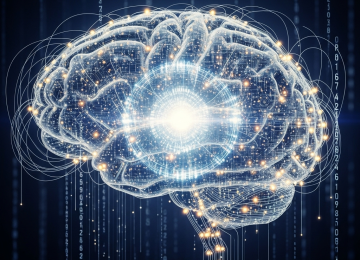5 Ways Artificial Intelligence (AI) is Changing Our World
Artificial Intelligence (AI) has rapidly moved from the realm of science fiction to a tangible, transformative force in our daily lives. This powerful branch of computer science focuses on building smart machines capable of performing tasks that typically require human intelligence. The impact of **AI** is no longer a distant future concept; it’s a present-day reality reshaping industries, streamlining processes, and creating new possibilities. From the way we receive medical care to how we consume entertainment, AI algorithms are working behind the scenes to make experiences more efficient, personalized, and data-driven. Understanding the key areas of its influence is crucial for navigating the modern technological landscape. Here, we explore five of the most significant ways AI is fundamentally changing our world.
1. Revolutionizing Healthcare with AI
The healthcare sector is undergoing a profound transformation thanks to the integration of AI. One of the most significant applications is in medical diagnostics. AI algorithms, particularly deep learning models, can analyze medical images like X-rays, MRIs, and CT scans with remarkable speed and accuracy. These systems can detect anomalies, such as tumors or signs of diabetic retinopathy, often earlier and with greater precision than the human eye. This doesn’t replace doctors but acts as a powerful assistive tool, reducing workload and improving patient outcomes.
Furthermore, AI is at the forefront of personalized medicine. By analyzing a patient’s genetic data, lifestyle, and medical history, AI models can help predict the risk of certain diseases and recommend tailored treatment plans. This moves healthcare from a one-size-fits-all approach to a highly individualized one. Drug discovery and development is another area being accelerated by AI. Machine learning can sift through vast biological datasets to identify potential drug candidates and predict their effectiveness, dramatically cutting down the time and cost associated with bringing a new drug to market.

2. Transforming the Business and Finance Sectors
In the world of business and finance, AI is a key driver of efficiency and security. Financial institutions use sophisticated AI systems to detect and prevent fraudulent transactions in real-time. These models analyze thousands of data points per transaction to spot unusual patterns that may indicate fraud, saving consumers and companies billions of dollars annually. Algorithmic trading, where AI makes high-speed trading decisions based on market data, now accounts for a massive portion of stock market activity.
Beyond finance, AI is optimizing business operations across the board. AI-powered chatbots and virtual assistants handle customer service inquiries 24/7, providing instant responses and freeing up human agents to focus on more complex issues. In logistics and supply chain management, AI algorithms optimize delivery routes, manage inventory, and predict demand with incredible accuracy, reducing costs and environmental impact. For more on this, check out this related technology story on process optimization.
3. The AI-Powered Creative and Entertainment Industry
The entertainment industry has been subtly yet significantly shaped by AI for years. The recommendation engines used by services like Netflix, Spotify, and YouTube are prime examples. These AI systems analyze your viewing and listening history to suggest new content tailored to your tastes, driving user engagement and content discovery.
More recently, generative AI has taken the creative world by storm. Tools like DALL-E, Midjourney, and Stable Diffusion can create stunningly detailed images from simple text prompts, opening up new avenues for artists and designers. Similarly, AI models are now capable of composing music, writing scripts, and even generating character dialogue for video games. As explained by industry leaders, the capabilities are expanding rapidly. An authoritative report from Reuters provides an excellent overview of what generative AI is and how it functions. This technology is both a tool for human creators and an emerging creative force in its own right.

4. Enhancing Transportation and Logistics
The dream of the self-driving car is closer than ever, thanks to massive advancements in AI. Autonomous vehicles use a complex suite of sensors, cameras, and powerful AI algorithms to perceive their environment, interpret traffic situations, and navigate safely. While fully autonomous cars are still in development, advanced driver-assistance systems (ADAS) powered by AI—such as adaptive cruise control, lane-keeping assist, and automated emergency braking—are already standard in many new vehicles, significantly improving road safety.
AI is also revolutionizing traffic management in smart cities. By analyzing real-time traffic data from sensors and GPS devices, AI systems can dynamically adjust traffic light timings to reduce congestion and improve flow. In the logistics industry, this translates to highly optimized delivery routes that save fuel, time, and money, ensuring that packages get from the warehouse to your doorstep faster than ever before.
5. Personalizing Education and Learning
AI is poised to make education more accessible, engaging, and effective. One of the most promising applications is personalized learning. AI-powered platforms can adapt to an individual student’s learning pace and style, providing customized exercises, resources, and feedback. If a student is struggling with a particular concept, the AI can offer additional explanations and practice problems, while allowing advanced students to move ahead more quickly. This tailored approach helps ensure that no student gets left behind.
AI also serves as a valuable tool for educators. It can automate administrative tasks like grading multiple-choice tests, freeing up teachers’ time to focus on one-on-one instruction and mentoring. Intelligent tutoring systems can act as 24/7 learning assistants, answering student questions and providing guidance outside of classroom hours. As AI technology continues to integrate into educational tools, it holds the potential to create a more equitable and effective learning environment for students everywhere.













